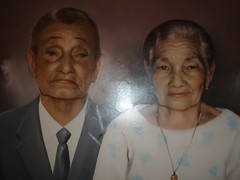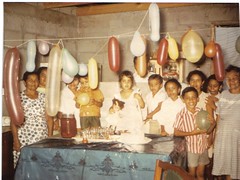Sabina the Wise
Another memorable woman in the Deago Rodríguez family was Angelita´s mother, Sabina Rodríguez, mother of two sons and seven daughters. She was born at the beginning of one century and almost lived to see the dawn of the next (1900-1990). She was known by her grandchildren as Sabia, the wise-woman, a tribute we could all hope to live to enjoy. Her children could tell me little about her background other than that she was one of two sisters whose mother died when she was three. She was known for her white skin - perhaps the reason she was so much more wrinkled than her daughters are now at nearly the same age - and her gentle but hardworking ways.
Although her two sons apparently preferred working on the farm to attending school, her daughters were not happy when abuelo pulled them out of school to work on the farm. I´m told that by the time Ñeca, the youngest, was 10 or so, Abuela made the decision to leave the farm and her husband to allow her daughter to continue in elementary school. Life was not easy in the town, but somehow, she and her daughters found a way to survive. The rift caused by the separation never mended and abuelo Lolo (Heliodoro) and abuela Sabina apparently never spoke again. In a culture in which family is the hub of social contacts, somehow Sabina and Lolo arranged never to be with the same daughter at the same time. The portrait pictured here was a composite ordered by her daughter Ángela and painted decades after the separation from separate photographs of each. (Abuelo, of course, never wore a suit and tie and was never without his sombrero pintado).
By the time I met Abuela, almost twenty years before her death, she was already a tiny, wrinkled, old woman who usually sat in a chair inclined against a wall on its two legs, crocheting and telling stories. When her first great-grandson was born in the United States (Raúl Tello), I commented that she must be very proud. She responded that she wished it had been a girl, that she wanted no grandsons born in the United States because in that country they send their sons to fight. How true that was in 1971, in the middle of the Vietnam War. Abuela, a truly wise-woman, may have known that while wars end, others begin. And as are the ways of the world, when that grandson turned 17, the United States had invaded another country - this time it was Panama.
That morning of December 1989, we watched in awe and fear the television images of the invading U.S. soldies poised behind trees on the beaches of Panama Viejo, aiming their machine guns at children who waited for schoolbuses at the entrance to the very neighborhood where our Panama City family lives. That evening, we watched troops leaving Fort Ord destined for Panama. Had great-grandson Raúl been a year older and had the draft still been in effect, he might have been sent to fight his own family.
We visited Panamá the following summer to see what was left after the invasion, the eradication of the entire Chorrillo neighorhood and the killing of so many Panamanians. Abuela, by this time, had had a stroke, was nearly blind, and spent much of her time drowsing in an easy chair in Yaya´s home. The daughters said she was hallucinating, but it seemed to me more like confabulation, as she tried to make meaning of the world she couldn´t see, between her moments of wakefulness and sleep. She spoke of one dream, of the house being filled with tall white, young men, but that they meant no harm. I´m sure she was speaking of her grandsons´s Nebur and Aaron, but did she know that the city and countryside were crawling with U.S. soldiers?
Sabina´s only sister, Lucinda was born four years earlier and remembered and told stories of another war - the war for independence from Colombia, finally achieved in 1903 when another U.S. president, Teddy Roosevelt, sent gunboats to patrol the harbors, preventing Colombian troops from entering as the Panamanians declared their independence from what remained of La Gran Colombia. Of course, Roosevelt´s intentions were far from altruistic, and Panamá gained its supposed independence in exchange for economic and military dependence to the United States for the next ninety-six years.
Just as Sabina was now ending her ninth decade in the care of her oldest daughter Rosa (Yaya) in Panama City, her sister Lucinda was cared for by her oldest daughter, also named Rosa in Chitré. By September of 1990, Lucinda had fallen into a coma and was in the regional Hospital of Herrera, a four hour drive from Panama City. Sabina´s greatest wish was to see her sister, a wish her children finally fulfilled that month. She spent several hours at her sister´s bedside, returned home and died the next morning. Her sister, still in a coma, died several hours later.
This photo pictures Kelly in the center at her third birthday party at tía Yaya´s house. Kelly is wearing a crochet dress and holding a doll with a matching bag and crocheted purse, all made by abuela. Abuela is on the far right.
Sabina is remembered by her children, grandchildren and great-great grandchildren, numbering in the hundreds. Two great-granddaughters are named in her honor. When Kelly (MsABCmom) chose to name her daughter Sabina Luz in honor of her own great-grandmother, she didn´t know that Abuela Sabina´s only sister was Lucinda.
As I wrote this poem in 1993, I had little knowledge of abuela Sabina´s early life, but wanted to encapsulate the memories of the abuela I had come to know.
To educate your daughters.
To conquer Panama."



